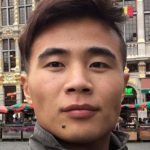Scott Kim first escaped North Korea at the age of 17, and ended up in and out of China for six years. Paying a broker to make it to South Korea was far out of reach for Kim and his mother. Instead, they lived as undocumented immigrants and worked as farm laborers in China. But one year after escaping North Korea, Kim’s neighbor reported his status to the police, who brought him and his mother back to North Korea.
Kim was taken to a detention center, where authorities determine where to send defectors next. He was put in a cell with 20 other defectors. There was one toilet in the corner and no space to lie down. Day and night, the defectors sat on the ground. When he or other defectors were told to proceed down the corridor to the warden’s office, they were made to crawl on their hands and feet. Officers beat them with gloves and sticks as they went. “We lost all our rights as human beings,” Kim said. “We were treated like animals, literally. We had to crawl on the floor to move from place to place.”
Despite the fact that one of North Korea’s biggest reeducation camps is in Chongori, near his hometown in Musan, Kim was sent to a center further south. Because no one knew him — and internet and phone service was nonexistent at the time — he was able to lie about his age, telling guards he was only 15 years old and had been in China looking for his mother. Rather than send him to one of the country’s brutal labor camps or political camps, he was sent to a center for orphaned children.
Shortly after arriving, he escaped and went back to China, where he got work as a farm laborer near Helong, a city in northeastern China. “Every day, I planted, farmed, logged on the mountain. Corn, beans, potatoes,” he said. “Life was better because I was not starving. I could eat and be full after meals.”
Kim was caught a second time, a neighbor again reporting him to the police. This second time he was sent back to North Korea, he wasn’t so lucky. He was sent to the concentration camp near his hometown. From there he was sent to a labor camp, where for months he chopped down trees on a mountain. He escaped one day when he realized that all his fellow laborers were at the top of the mountain chopping while he was at the bottom. He ran away as fast as he could until he found a train that he could take him north to cross the border with China again.
After some time in China, he was caught a third time and sent to a camp for political prisoners — the worst place to be sent, as imprisonment there is interminable. He escaped the camp by bribing the authorities through a broker, who helped him make it across the border with China a final time.
In China, he went back to work to pay off his debt to the broker. One day, he got a call from a North Korean woman who told him that his mother was dying of cancer. For the first time in many years, the two saw each other. “When I opened the door of my mother’s house, I froze, and couldn’t say anything, because my mother looked incredibly different,” he said. “There was no fat on her, and her whole body looked like a triangle, I just went outside and cried for a long time and came back again, and I embraced my mother and we cried together.”
Several days later, a friend of his mother offered his mother the opportunity to escape to South Korea via Laos and Cambodia. A broker was taking a group; they had an extra space. Unable to walk, Kim’s mother told Kim he had to go and become educated. Once he was settled, she said, he could bring her and help others in need. He decided to go. The night before Kim and the group of defectors were to cross the border into Laos, he received a call telling him that his mother had died.
In 2007, six years after he first escaped, Kim finally made it to South Korea.
[Business Insider]

 My name is Charles. I was born in North Korea on October 1st, 1994. My father left us when I was five years old and my mother passed away six years later from starvation. For years, I had to figure out how to live alone. I begged for food from strangers on the street, battling starvation and freezing weather.
My name is Charles. I was born in North Korea on October 1st, 1994. My father left us when I was five years old and my mother passed away six years later from starvation. For years, I had to figure out how to live alone. I begged for food from strangers on the street, battling starvation and freezing weather.